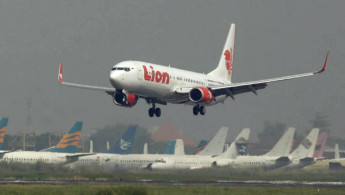Indonesia recovers second black box from deadly plane crash
The cockpit voice recorder from an Indonesian Lion Air jet that crashed in October has been recovered, officials said Monday, a discovery that could be critical to explaining why a brand new plane fell out of the sky just after take-off.
The Boeing 737 MAX vanished from radar about 13 minutes after departing Jakarta, slamming into the Java Sea moments after pilots had asked to return to the capital and killing all 189 people onboard.
The bright orange voice recorder was discovered early Monday about 10 metres from a flight data recorder that was pinpointed back in November, authorities said.
"But it's broken into two pieces so hopefully it's still useful" to investigators, Haryo Satmiko, deputy head of Indonesia's National Transportation Safety Committee (NTSC), said.
More human remains were also found near the voice recorder, he added, without giving details.
"This will really help the investigation process... and could give some more answers on the cause" of the crash, said Jakarta-based aviation analyst Dudi Sudibyo.
The plane's previously discovered flight data recorder supplied information about the speed, altitude and direction of the plane before it plunged into the sea on 29 October.
A preliminary crash report from Indonesia's transport safety agency suggested that pilots of Flight 610 struggled to control the plane's anti-stalling system just before the accident.
It also found that the Lion Air jet should have been grounded over a recurrent technical problem before its fatal journey, as it criticised the budget carrier's poor safety culture.
But it did not pinpoint a definitive cause of the crash and a final report is not likely to come before later this year.
|
|
Boeing lawsuits
Despite the name, black boxes are usually bright orange with reflective stripes, and all commercial planes are obliged to have them on board.
They're built to survive at vast depths and in extreme heat, and are fitted with a beacon which can emit a signal for one month.
Black box data help explain nearly 90 percent of all crashes, according to aviation experts.
Authorities called off the grim task of identifying victims of the crash in November, with only 125 people identified after tests on human remains that filled some 200 body bags.
Despite a dubious safety record and an avalanche of complaints over shoddy service, the budget carrier's parent Lion Air Group, which operates five other airlines, has captured half the domestic market in less than 20 years of operation.
It has now become Southeast Asia's biggest airline group by fleet.
Nearly 30 relatives of the crash victims have filed lawsuits against Boeing, alleging faults with the 737 MAX led to the deaths.Indonesia's aviation safety record has improved since its airlines, including national carrier Garuda, were subject to years-long bans from US and European airspace for safety violations, but the country still recorded more than three dozen fatal accidents over the past 15 years.
The single-aisle Boeing plane is one of the world's newest and most advanced commercial passenger jets.
After investigators said the doomed aircraft had problems with its airspeed indicator and angle of attack (AoA) sensors, Boeing issued a special bulletin telling operators what to do when they face the same situation.
An AoA sensor provides data about the angle at which air passes over the wings and tells pilots how much lift a plane is getting. The information can be critical in preventing an aircraft from stalling.
The plane's flight data recorder showed that pilots had repeatedly tried to correct its nose from pointing down, possibly after erroneous data from AoA sensors was fed into a system that automatically adjusts some of its movements.
The preliminary crash report stopped short of making any recommendations to Boeing but it has come under fire for possible glitches on the 737 MAX, which entered service in 2017.





 Follow the Middle East's top stories in English at The New Arab on Google News
Follow the Middle East's top stories in English at The New Arab on Google News


